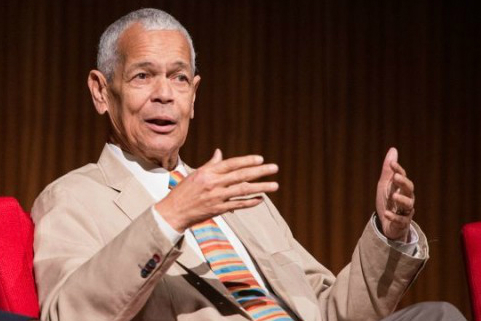Longtime civil rights and nonprofit sector leader Julian Bond died Saturday in Fort Walton Beach, Fla., after what family members described only as a brief illness. He was 75.
“From his days as a young activist to his years as both an elder statesman and NAACP chairman emeritus, Julian Bond inspired a generation of civil rights leaders,” NAACP Chairman Roslyn M. Brock said via in a statement released yesterday.
“Like so many of my generation and before, I am yet inspired by the depth and breadth of Chairman Emeritus Bond’s exemplary service: activist, writer, historian, professor, public intellectual, public servant and an unrelentingly eloquent voice for the voiceless. The grateful citizen heirs of the civil and human rights legacy of Julian Bond can neither be counted nor confined to a generation. Many of the most characteristically American freedoms enjoyed by so many Americans today were made real because of the lifelong sacrifice and service of Julian Bond,” she said.
“The nation and the NAACP deeply grieve Julian Bond’s death even as we are profoundly grateful for his life,” said NAACP President and CEO Cornell William Brooks. “The arc of service of Chairman Emeritus Julian Bond’s life extends high and wide over America’s social justice landscape: as a young lieutenant of Martin Luther King Jr., gifted writer, eloquent speaker, esteemed professor, Georgia state senator, nominee for U.S. vice president, revered civil rights leader, champion for marriage equality and well beloved NAACP Chairman Emeritus,” he said. “This is a moment of incalculable loss in a trying hour of innumerable civil right challenges. The life and legacy, indeed the eloquence of Julian Bond’s example, yet speak to the present and future of the NAACP.”
He was elected chairman of the NAACP in 1998. The organization said details of how to commemorate and memorialize Bond’s legacy would be shared at a later date.
In a statement released yesterday, President Barack Obama called Bond a hero and a friend, benefiting from his example, his counsel and his friendship. “Julian Bond helped change this country for the better. And what better way to be remembered than that.”
While a student at Morehouse College in Atlanta, Bond helped found the Student Nonviolent Coordinating Committee (SNCC) and served as communications director from 1961 to 1966.
He led student protests against segregation in public facilities in Georgia from 1960 to 1963. Bond graduated from Morehouse and helped found the Southern Poverty Law Center (SPLC). He was the organization’s first president, serving from 1971 to 1979, and later as a member of the board of directors.
“With Julian’s passing, the country has lost one of its most passionate and eloquent voices for the cause of justice. He advocated not just for African-Americans but for every group, indeed every person subject to oppression and discrimination, because he recognized the common humanity in us all,” SPLC co-founder Morris Dees said via a statement posted on the SPLC website. “Not only has the country lost a hero today, we’ve lost a great friend,” he said.
Bond was elected to the Georgia House of Representatives in 1965. White members of the House refused to seat him because of his opposition to the Vietnam War. In 1966, the United States Supreme Court ruled that the Georgia House had denied Bond his freedom of speech and had to seat him. From 1965 to 1975, he served in the Georgia House and served six terms in the Georgia Senate, from 1975 to 1986.
Bond led a challenge delegation from Georgia to the raucous 1968 Democratic National Convention in Chicago, and was the first African-American nominated as vice president of the United States. He withdrew his name from the ballot because he was too young to serve, being just 27 at the time.
Bond ran for the United States House of Representatives in 1986 but lost to civil rights leader John Lewis (D-Ga.). In a series of Tweets posted Sunday morning, Lewis acknowledged a “difficult period” in their relationship after a bruising campaign for Congress but said the two emerged closer. “Julian Bond was one of a kind. We worked together in the Civil Rights Movement and he became one of my closest and dearest friends. Julian was so smart, so gifted, and so talented. He was deeply committed to making our country a better country,” Lewis said. “Julian Bond’s leadership and his spirit will be deeply missed.”
In the 1980s and ‘90s, Bond taught at several universities, including Harvard, American, Drexel, Williams, the University of Pennsylvania and the University of Virginia.
Bond continued with his activism as Chairman Emeritus of the NAACP, after serving 11 years as chairman and working to educate the public about the history of the Civil Rights Movement and the struggles that African-Americans endured.
Born in Nashville, Tenn., Bond’s family moved to Pennsylvania when he was 5 years old when his father, Horace Mann Bond, became the first African-American president of Pennsylvania’s Lincoln University, his alma mater. Bond attended Morehouse College in Atlanta and won a varsity letter for swimming. He also founded a literary magazine called “The Pegasus” and served as an intern at Time magazine.
Survivors include his wife, Pamela Horowitz, a former SPLC staff attorney, five children and eight grandchildren.










